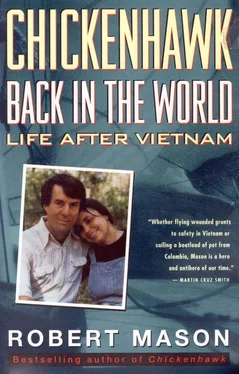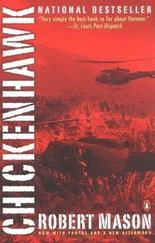Robert Mason - Chickenhawk - Back in the World - Life After Vietnam
Здесь есть возможность читать онлайн «Robert Mason - Chickenhawk - Back in the World - Life After Vietnam» весь текст электронной книги совершенно бесплатно (целиком полную версию без сокращений). В некоторых случаях можно слушать аудио, скачать через торрент в формате fb2 и присутствует краткое содержание. Год выпуска: 2013, Издательство: BookBaby, Жанр: Старинная литература, на английском языке. Описание произведения, (предисловие) а так же отзывы посетителей доступны на портале библиотеки ЛибКат.
- Название:Chickenhawk: Back in the World - Life After Vietnam
- Автор:
- Издательство:BookBaby
- Жанр:
- Год:2013
- ISBN:нет данных
- Рейтинг книги:3 / 5. Голосов: 1
-
Избранное:Добавить в избранное
- Отзывы:
-
Ваша оценка:
- 60
- 1
- 2
- 3
- 4
- 5
Chickenhawk: Back in the World - Life After Vietnam: краткое содержание, описание и аннотация
Предлагаем к чтению аннотацию, описание, краткое содержание или предисловие (зависит от того, что написал сам автор книги «Chickenhawk: Back in the World - Life After Vietnam»). Если вы не нашли необходимую информацию о книге — напишите в комментариях, мы постараемся отыскать её.
Chickenhawk: Back in the World - Life After Vietnam — читать онлайн бесплатно полную книгу (весь текст) целиком
Ниже представлен текст книги, разбитый по страницам. Система сохранения места последней прочитанной страницы, позволяет с удобством читать онлайн бесплатно книгу «Chickenhawk: Back in the World - Life After Vietnam», без необходимости каждый раз заново искать на чём Вы остановились. Поставьте закладку, и сможете в любой момент перейти на страницу, на которой закончили чтение.
Интервал:
Закладка:
I pecked at stories. Patience shopped and learned how to cook Spanish food.
Jack knew everybody and spoke Spanish like a native. I saw him run into Bar Buenos Aires one afternoon while I was there. He didn’t see me. His friends stayed in the street, too shy to come in without their parents. Jack—who was allowed by everybody to do anything he wanted—swaggered over to the counter and tapped a duro—a Spanish nickel—on top, demanding a chupa , a lollipop. His head was a foot lower than the countertop. Jose Manuel, the owner of the bar, leaned over, grinned, and handed Jack some chupas and took the coin. Jack walked outside and gave each of his friends a candy and they ran off together, a regular little mob of street urchins.
Jack accepted Almonaster as home with the aplomb of a five-year- old. When Patience and I went to Morocco, we left him in the village with Escopeta’s family, the owners of the grocery. Jack was especially good friends with Escopeta’s son, Manolo, but he was in love with Escopeta’s teenage daughter, Manola. She spoiled him with attention. When we came back a week later with an English couple we’d befriended on the trip, the village kids, dirty faces, short pants, big smiles, swarmed around the Roach, laughing and yelling. Patience pointed out one of the kids as our son. Our new friends were amazed.
This expatriate stuff was getting old. America was in the news— Neil Armstrong had just landed on the moon (most people thought that was great, but one old sage at the Casino warned that it was all done in a studio, with actors and a model lunar lander). As much as I was immersed in the Spanish culture, I missed the States. That was difficult to accept. I had no respect for the political system that created Vietnam, yet I missed the country and the people. The point of this visit, to forget Vietnam and to recover my sanity, was not working. My writing was getting nowhere because I lacked the faith that I could do it. I was drinking a quart of booze a day.
In October 1969, Patience got a letter saying her father had died. The news came when we both wanted to go home. I phoned my dad and borrowed traveling money. We drove to Lisbon to catch a Yugoslavian freighter home. The Roach, which I’d figured would be dead by now, was still running great. Selling it in Spain meant a lot of paperwork and import taxes. The shipping company said it would cost two hundred dollars to bring it with us. We loaded it on the ship.
The Yugoslavian freighter took two weeks to sail from Lisbon to New York because of bad weather. We were three of the twelve passengers on board. We sailed through storms that sank other freighters, tankers, and seagoing tugs. Waves bashed into the superstructure, crashing against the passengers’ portholes. Jack got thrown across the main stateroom, sitting in a giant wooden chair, looking very surprised. Patience weathered the storm in her bunk, sick. I took photographs, making time exposures of the waves crashing against the portholes. I was sober for the entire trip because the ship only had two kinds of booze: scotch, which I couldn’t stand, and some ungodly swill called Slivovitska, a plum brandy that tasted worse than it sounded.
When we were a day out, we all crowded around a portable radio and cheered hearing an American commercial jingle: “Chock Full o’ Nuts is the hea-ven-ly coffee …” Home.
CHAPTER 4
November 1969—We stayed with my parents in North Palm Beach, Florida. I looked for work while we lived off the modest insurance benefit Patience got from her father.
We were feeling so well off (the insurance money came to three thousand dollars) that we decided to fly to Tampa to visit friends. I rented a Cessna at Palm Beach International Airport, loaded up Patience and Jack, and took off. Hadn’t flown in three years. Felt good. Patience was more impressed that I was able to understand the tower gibberish than that I could fly. Flying made her sick, too. Jack sat on my lap and yanked the control yoke around like he was on a twenty-five-cent sidewalk ride. He couldn’t see over the top of the console, but he was a natural pilot. Whoop! Zoom! Wow! Patience got sick, nixing Jack’s flying lessons for the rest of the trip.
We spent the night in Tampa and went back to the plane early in the morning. I’d parked at a grass-strip airport and the plane was covered in dew. While I wiped the windshield and did the preflight, I had the feeling I was over there. I used to do this every morning, getting my Huey ready for the assaults. I felt myself getting tense.
Got in the plane, cranked up. Did a warm-up where I was parked and then pushed in full throttle. We roared down the grass strip and I lifted off, keeping the plane low. I thought I was in a Huey and that Patience and Jack weren’t there. I was taking off at An Khe, heading east toward the pass. I skimmed over the trees at the end of the strip and stayed low among the treetops—hard to hit you when you’re in the trees. Patience asked if we weren’t a little low and I remembered where I was. I stayed low and flew directly toward a tall tree. She said, “Bob?” I pulled up over the tree, just missing the branches, caught a glimpse of the morning sun, felt myself relax. I climbed to cruising altitude. “Are you okay?” Patience said. I nodded.
I was accepted for a job at Pratt & Whitney to make high-speed movies of jet engines in action—I knew enough about photography to bullshit the head of the project. I also had an opportunity to work for Radiation, an electronics manufacturer, in Palm Bay because a friend of mine who worked there, Bill Willis, knew they needed a photo-technician. Willis, a big blond man, and I grew up together west of Delray Beach, Florida. We shared a common interest in science and technology, and I was in the mood for that. Also, the pay at Radiation was better. I took that job.
I’d never worked in an electronics factory before. They put me on the night shift photographing circuit diagrams with a room-sized process camera and developing the twenty-by-thirty-inch film sheets. The job required some skill, but not so much that I was kept occupied. I soon became bored and started taking two-hour lunch breaks. I would wander around the whole place, seeing how they built integrated circuit chips. I saw the whole process, from actually growing the silicon crystal, slicing it to wafers, sensitizing the wafers with photoresists, doping, photomask exposures, etching, testing, and final cutting. Interesting stuff, but my niche in the process—photomask technician—wasn’t very exciting. I think the most interesting project I ever worked on was making microphotographs of a competitor’s chip. Electronics companies do this regularly—they buy another company’s hot new chip and grind it down, layer by layer, and photograph each layer. With the photos, the engineers can see how the thing works and rip off the design.
As long as the projects changed often and as long as they were challenging, I was interested. But that was rare. Usually I messed around with my own photography experiments or played with the computer. Computers were novel in 1970. We had a Digital PDP-8 that I knew just enough about to be its greatest threat. One night, as I taught myself the octal numbering system by flipping toggles on the computer’s front panel and watching all the nifty lights flash, I somehow sent messages to the computer that made it dump the main program—the one we used to create some of the photomask templates. Naturally, I didn’t mention this to anyone when I left. When I came to work the next afternoon, the place was a madhouse. Since no one there actually understood the computer, they’d flown in a consultant from New York to straighten things out. Photomask production was stalled. The boss asked me if I knew anything about it. Heck no, Boss. I’m always in the darkroom.
Читать дальшеИнтервал:
Закладка:
Похожие книги на «Chickenhawk: Back in the World - Life After Vietnam»
Представляем Вашему вниманию похожие книги на «Chickenhawk: Back in the World - Life After Vietnam» списком для выбора. Мы отобрали схожую по названию и смыслу литературу в надежде предоставить читателям больше вариантов отыскать новые, интересные, ещё непрочитанные произведения.
Обсуждение, отзывы о книге «Chickenhawk: Back in the World - Life After Vietnam» и просто собственные мнения читателей. Оставьте ваши комментарии, напишите, что Вы думаете о произведении, его смысле или главных героях. Укажите что конкретно понравилось, а что нет, и почему Вы так считаете.












